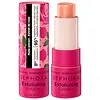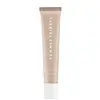What's inside
What's inside
 Key Ingredients
Key Ingredients

 Benefits
Benefits

 Concerns
Concerns

 Ingredients Side-by-side
Ingredients Side-by-side

Hydrogenated Vegetable Oil
EmollientRicinus Communis Seed Oil
MaskingSucrose
HumectantHelianthus Annuus Seed Wax
Skin ConditioningButyrospermum Parkii Butter
Skin ConditioningSorbitan Olivate
EmulsifyingDisteardimonium Hectorite
StabilisingLauroyl Lysine
Skin ConditioningTheobroma Cacao Seed Butter
EmollientParfum
MaskingPropylene Carbonate
SolventCI 77947
Dicalcium Phosphate
AbrasiveTocopherol
AntioxidantHelianthus Annuus Seed Oil
EmollientCI 77491
Cosmetic ColorantRosa Damascena Flower Extract
MaskingCI 77492
Cosmetic ColorantHydrogenated Vegetable Oil, Ricinus Communis Seed Oil, Sucrose, Helianthus Annuus Seed Wax, Butyrospermum Parkii Butter, Sorbitan Olivate, Disteardimonium Hectorite, Lauroyl Lysine, Theobroma Cacao Seed Butter, Parfum, Propylene Carbonate, CI 77947, Dicalcium Phosphate, Tocopherol, Helianthus Annuus Seed Oil, CI 77491, Rosa Damascena Flower Extract, CI 77492
Phytosteryl/Isostearyl/Cetyl/Stearyl/Behenyl Dimer Dilinoleate
Skin ConditioningDiisostearyl Malate
EmollientHydrogenated Polyisobutene
EmollientPolybutene
Hydrogenated Poly(C6-14 Olefin)
EmollientButyrospermum Parkii Butter
Skin ConditioningMicrocrystalline Wax
Emulsion StabilisingOctyldodecanol
EmollientSynthetic Wax
AbrasiveDisteardimonium Hectorite
StabilisingAstrocaryum Murumuru Seed Butter
EmollientSodium Hyaluronate
HumectantVanillin
MaskingTocopherol
AntioxidantPropylene Carbonate
SolventPolyglyceryl-2 Diisostearate
EmulsifyingMica
Cosmetic ColorantBHT
AntioxidantPhytosteryl/Isostearyl/Cetyl/Stearyl/Behenyl Dimer Dilinoleate, Diisostearyl Malate, Hydrogenated Polyisobutene, Polybutene, Hydrogenated Poly(C6-14 Olefin), Butyrospermum Parkii Butter, Microcrystalline Wax, Octyldodecanol, Synthetic Wax, Disteardimonium Hectorite, Astrocaryum Murumuru Seed Butter, Sodium Hyaluronate, Vanillin, Tocopherol, Propylene Carbonate, Polyglyceryl-2 Diisostearate, Mica, BHT
 Reviews
Reviews

Ingredients Explained
These ingredients are found in both products.
Ingredients higher up in an ingredient list are typically present in a larger amount.
This ingredient is also known as shea butter. It is an effective skin hydrator and emollient.
Emollients help soothe and soften your skin. It does this by creating a protective film on your skin. This barrier helps trap moisture and keeps your skin hydrated. Emollients may be effective at treating dry or itchy skin.
Shea butter is rich in antioxidants. Antioxidants help fight free-radicals, or molecules that may harm the body. It is also full of fatty acids including stearic acid and linoleic acid. These acids help replenish the skin and keep skin moisturized.
While Shea Butter has an SPF rating of about 3-4, it is not a sunscreen replacement.
Shea butter may not be fungal acne safe. We recommend speaking with a professional if you have any concerns.
Learn more about Butyrospermum Parkii ButterDisteardimonium Hectorite comes from the clay mineral named hectorite. It is used to add thickness to a product.
It can also help stabilize a product by helping to disperse other ingredients.
Hectorite is a rare, white clay mineral.
Learn more about Disteardimonium HectoriteThis ingredient is a solvent. It helps dissolve active ingredients and alter the texture of products.
Propylene Carbonate is commonly used in makeup and with clay, such as montmorillonite or bentonite.
Studies show this ingredient to be safe for cosmetics. When it is undiluted, it can cause skin irritation. (It is always diluted in skincare and makeup). This ingredient is water-soluble.
Propylene Carbonate is created from propylene glycol and carbonic acid.
Learn more about Propylene CarbonateTocopherol (also known as Vitamin E) is a common antioxidant used to help protect the skin from free-radicals and strengthen the skin barrier. It's also fat soluble - this means our skin is great at absorbing it.
Vitamin E also helps keep your natural skin lipids healthy. Your lipid skin barrier naturally consists of lipids, ceramides, and fatty acids. Vitamin E offers extra protection for your skin’s lipid barrier, keeping your skin healthy and nourished.
Another benefit is a bit of UV protection. Vitamin E helps reduce the damage caused by UVB rays. (It should not replace your sunscreen). Combining it with Vitamin C can decrease sunburned cells and hyperpigmentation after UV exposure.
You might have noticed Vitamin E + C often paired together. This is because it is great at stabilizing Vitamin C. Using the two together helps increase the effectiveness of both ingredients.
There are often claims that Vitamin E can reduce/prevent scarring, but these claims haven't been confirmed by scientific research.
Learn more about Tocopherol